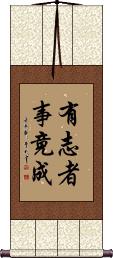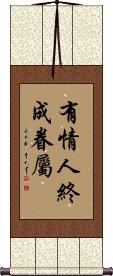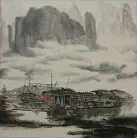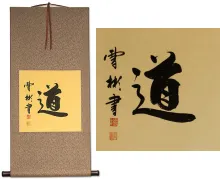Many custom options...
And formats...

Find in Chinese / Japanese...
Buy a Find calligraphy wall scroll here!
Personalize your custom “Find” project by clicking the button next to your favorite “Find” title below...
Mark the boat to find the lost sword / Ignoring the changing circumstances of the world
刻舟求劍 is an originally-Chinese proverb that serves as a warning to people that things are always in a state of change.
Thus, you must consider that and not depend on the old ways or a way that may have worked in the past but is no longer valid.
This idiom/proverb comes from the following story:
A man was traveling in a ferry boat across a river. With him, he carried a treasured sword. Along the way, the man became overwhelmed and intoxicated by the beautiful view and accidentally dropped his prized sword into the river. Thinking quickly, he pulled out a knife and marked on the rail of the boat where exactly he had lost his sword.
When the boat arrived on the other side of the river, the man jumped out of the boat and searched for his sword right under where he'd made the mark. Of course, the boat had moved a great distance since he made the mark, and thus, he could not find the sword.
While this man may seem foolhardy, we must take a great lesson from this parable: Circumstances change, so one should use methods to handle the change. In modern China, this is used in business to mean that one should not depend on old business models for a changing market.
This proverb dates back to the Spring and Autumn period (770–476 BC) of the territory now known as China. It has spread and is somewhat known in Japan and Korea.
A Truly Determined Person Will Find a Solution
Achieve Inner Peace; Find Deep Understanding
寧靜而致遠 is five characters from a longer ten-character proverb composed by Zhuge Liang about 1800 years ago.
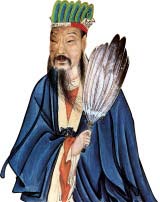
诸葛亮 Zhuge Liang
The proverb means “Your inner peace/tranquility/serenity will help you see or reach far (into the world).”
The last word means “far” but the deeper meaning is that you will surpass what you can currently see or understand. Perhaps even opening up vast knowledge and understanding of complex ideas.
Love Will Find A Way
Love Will Find A Way
This in-stock artwork might be what you are looking for, and ships right away...
Gallery Price: $61.00
Your Price: $33.88
These search terms might be related to Find:
Achieve Inner Peace; Find Deep Understanding
Black or White Cat Matters Not as Long as It Can Catch Mice
Determination to Achieve
Determination to Achieve / Will-Power
Drain the Pond to Get All the Fish
Fall Down Seven Times, Get Up Eight
How Can You Catch Tiger Cubs Without Entering the Lair of the Tiger?
Learn From Wisdom
Learn From Your Predecessors
Learn New Ways From Old / Onkochishin
Realize Your Ambitions / Embrace Your Ambition
Realize Your Ambitions / Ride on the Crest of Success
Realize Your Dreams
Serendipity / Chance Discovery
Study / Learn / School
We Are Not Born With Knowledge, How Does One Achieve Maturity?
Without a Big Net, How Can You Catch Fish?
You May Learn From Victory, You Will Learn From Failure
Not the results for Find that you were looking for?
Below are some entries from our dictionary that may match your Find search...
| Characters If shown, 2nd row is Simp. Chinese |
Pronunciation Romanization |
Simple Dictionary Definition |
牛 see styles |
niú niu2 niu ushi(p); gyuu; ushi / ushi(p); gyu; ushi うし(P); ぎゅう; ウシ |
More info & calligraphy: Ox / Bull / Cow(1) cattle (Bos taurus); cow; bull; ox; calf; (2) {food} (usu. ぎゅう) (See 牛肉) beef; (3) (ぎゅう only) {astron} (See 二十八宿,玄武・げんぶ・2) Chinese "Ox" constellation (one of the 28 mansions); (surname) Niu go, gaus; ox, bull, bullock, etc. A term applied to the Buddha Gautama as in 牛王 king of bulls, possibly because of the derivation of his name; the phrase 騎牛來牛 (or 騎牛覔牛) to ride an ox, to seek an ox, means to use the Buddha to find the Buddha. |
覺 觉 see styles |
jué jue2 chüeh satoru さとる |
More info & calligraphy: Awareness(personal name) Satoru bodhi, from bodha, 'knowing, understanding', means enlightenment, illumination; 覺 is to awake, apprehend, perceive, realize; awake, aware; (also, to sleep). It is illumination, enlightenment, or awakening in regard to the real in contrast to the seeming; also, enlightenment in regard to moral evil. Cf. 菩提 and 佛. |
絕處逢生 绝处逢生 see styles |
jué chù féng shēng jue2 chu4 feng2 sheng1 chüeh ch`u feng sheng chüeh chu feng sheng |
More info & calligraphy: Return From Death’s Door |
天無絕人之路 天无绝人之路 see styles |
tiān wú jué rén zhī lù tian1 wu2 jue2 ren2 zhi1 lu4 t`ien wu chüeh jen chih lu tien wu chüeh jen chih lu |
More info & calligraphy: There is always a way out |
有志者事竟成 see styles |
yǒu zhì zhě shì jìng chéng you3 zhi4 zhe3 shi4 jing4 cheng2 yu chih che shih ching ch`eng yu chih che shih ching cheng |
More info & calligraphy: A Truly Determined Person Will Find a Solution |
有情人終成眷屬 有情人终成眷属 see styles |
yǒu qíng rén zhōng chéng juàn shǔ you3 qing2 ren2 zhong1 cheng2 juan4 shu3 yu ch`ing jen chung ch`eng chüan shu yu ching jen chung cheng chüan shu |
More info & calligraphy: Love Will Find A Way |
嘖 啧 see styles |
zé ze2 tse |
(interj. of admiration or of disgust); to click one's tongue; to attempt to (find an opportunity to) speak |
找 see styles |
zhǎo zhao3 chao |
to try to find; to look for; to call on sb; to find; to seek; to return; to give change |
擠 挤 see styles |
jǐ ji3 chi |
to crowd in; to cram in; to force others aside; to press; to squeeze; to find (time in one's busy schedule) |
樂 乐 see styles |
yuè yue4 yüeh ran らん |
music (surname) Ran Music, that which causes joy, hence joy, joyful, glad, rejoice; also to find joy in, enjoy. |
覓 觅 see styles |
mì mi4 mi motomu もとむ |
(literary) to seek; to find (given name) Motomu to search for |
三餘 三余 see styles |
sān yú san1 yu2 san yü sanyo |
The three after death remainders, or continued mortal experiences, of śrāvakas and pratyekabuddhas, who mistakenly think they are going to 無餘涅槃final nirvāṇa, but will still find 煩惱餘 further passion and illusion, 業餘 further karma, and 果餘 continued rebirth, in realms beyond the 三界trailokya. |
不迭 see styles |
bù dié bu4 die2 pu tieh |
cannot cope; find it too much; incessantly |
了解 see styles |
liǎo jiě liao3 jie3 liao chieh ryōkai りょうかい |
to understand; to realize; to find out (noun/participle) comprehension; consent; understanding; agreement; roger (on the radio) clear understanding |
借故 see styles |
jiè gù jie4 gu4 chieh ku |
to find an excuse |
儲物 储物 see styles |
chǔ wù chu3 wu4 ch`u wu chu wu moukemono / mokemono もうけもの |
to store things; to stow items good bargain; a find; godsend; a steal |
具保 see styles |
jù bǎo ju4 bao3 chü pao |
to find guarantor; to find surety |
出脫 出脱 see styles |
chū tuō chu1 tuo1 ch`u t`o chu to |
to manage to sell; to dispose of something (by selling); to get property off one's hands; to find excuses (to get off a charge); to extricate sb (from trouble); to vindicate; to become prettier (of child) |
取樂 取乐 see styles |
qǔ lè qu3 le4 ch`ü le chü le |
to find amusement; to amuse oneself |
嗅探 see styles |
xiù tàn xiu4 tan4 hsiu t`an hsiu tan |
to sniff (in order to find something) |
大乘 see styles |
dà shèng da4 sheng4 ta sheng oonori おおのり |
Mahayana, the Great Vehicle; Buddhism based on the Mayahana sutras, as spread to Central Asia, China and beyond; also pr. [Da4 cheng2] (surname) Oonori Mahāyāna; also called 上乘; 妙乘; 勝乘; 無上乘; 無上上乘; 不惡乘; 無等乘, 無等等乘; 摩訶衍 The great yāna, wain, or conveyance, or the greater vehicle in comparison with the 小乘 Hīnayāna. It indicates universalism, or Salvation for all, for all are Buddha and will attain bodhi. It is the form of Buddhism prevalent in Tibet, Mongolia, China, Korea, Japan, and in other places in the Far East. It is also called Northern Buddhism. It is interpreted as 大教 the greater teaching as compared with 小教 the smaller, or inferior. Hīnayāna, which is undoubtedly nearer to the original teaching of the Buddha, is unfairly described as an endeavour to seek nirvana through an ash-covered body, an extinguished intellect, and solitariness; its followers are sravakas and pratyekabuddhas (i.e. those who are striving for their own deliverance through ascetic works). Mahāyāna, on the other hand, is described as seeking to find and extend all knowledge, and, in certain schools, to lead all to Buddhahood. It has a conception of an Eternal Buddha, or Buddhahood as Eternal (Adi-Buddha), but its especial doctrines are, inter alia, (a) the bodhisattvas 菩薩 , i.e. beings who deny themselves final Nirvana until, according to their vows, they have first saved all the living; (b) salvation by faith in, or invocation of the Buddhas or bodhisattvas; (c) Paradise as a nirvana of bliss in the company of Buddhas, bodhisattvas, saints, and believers. Hīnayāna is sometimes described as 自利 self-benefiting, and Mahāyāna as 自利利他 self-benefit for the benefit of others, unlimited altruism and pity being the theory of Mahāyāna. There is a further division into one-yana and three-yanas: the trīyāna may be śrāvaka, pratyeka-buddha, and bodhisattva, represented by a goat, deer, or bullock cart; the one-yāna is that represented by the Lotus School as the one doctrine of the Buddha, which had been variously taught by him according to the capacity of his hearers, v. 方便. Though Mahāyāna tendencies are seen in later forms of the older Buddhism, the foundation of Mahāyāna has been attributed to Nāgārjuna 龍樹. "The characteristics of this system are an excess of transcendental speculation tending to abstract nihilism, and the substitution of fanciful degrees of meditation and contemplation (v. Samādhi and Dhyāna) in place of the practical asceticism of the Hīnayāna school."[Eitel 68-9.] Two of its foundation books are the 起信論and the 妙法蓮華經 but a larnge numberof Mahāyāna sutras are ascribed to the Buddha。. |
套問 套问 see styles |
tào wèn tao4 wen4 t`ao wen tao wen |
to sound sb out; to find out by tactful indirect questioning |
安置 see styles |
ān zhì an1 zhi4 an chih anchi あんち |
to find a place for; to help settle down; to arrange for; to get into bed; placement (noun, transitive verb) enshrinement; installation (of an image) to leave (something) peacefully as it is |
安頓 安顿 see styles |
ān dùn an1 dun4 an tun |
to find a place for; to help settle down; to arrange for; undisturbed; peaceful |
容身 see styles |
róng shēn rong2 shen1 jung shen |
to find a place where one can fit in; to make one's home; to seek shelter |
察訪 察访 see styles |
chá fǎng cha2 fang3 ch`a fang cha fang |
to make an investigative visit; to go and find out from the source |
尋出 寻出 see styles |
xún chū xun2 chu1 hsün ch`u hsün chu |
to find out; to search out; to uncover; to discover |
尋獲 寻获 see styles |
xún huò xun2 huo4 hsün huo |
to find; to track down; to recover (something lost) |
小乘 see styles |
xiǎo shèng xiao3 sheng4 hsiao sheng shōjō |
Hinayana, the Lesser Vehicle; Buddhism in India before the Mayahana sutras; also pr. [Xiao3 cheng2] Hīnayāna 希那衍. The small, or inferior wain, or vehicle; the form of Buddhism which developed after Śākyamuni's death to about the beginning of the Christian era, when Mahāyāna doctrines were introduced. It is the orthodox school and more in direct line with the Buddhist succession than Mahāyānism which developed on lines fundamentally different. The Buddha was a spiritual doctor, less interested in philosophy than in the remedy for human misery and perpetual transmigration. He "turned aside from idle metaphysical speculations; if he held views on such topics, he deemed them valueless for the purposes of salvation, which was his goal" (Keith). Metaphysical speculations arose after his death, and naturally developed into a variety of Hīnayāna schools before and after the separation of a distinct school of Mahāyāna. Hīnayāna remains the form in Ceylon, Burma, and Siam, hence is known as Southern Buddhism in contrast with Northern Buddhism or Mahāyāna, the form chiefly prevalent from Nepal to Japan. Another rough division is that of Pali and Sanskrit, Pali being the general literary language of the surviving form of Hīnayāna, Sanskrit of Mahāyāna. The term Hīnayāna is of Mahāyānist origination to emphasize the universalism and altruism of Mahāyāna over the narrower personal salvation of its rival. According to Mahāyāna teaching its own aim is universal Buddhahood, which means the utmost development of wisdom and the perfect transformation of all the living in the future state; it declares that Hīnayāna, aiming at arhatship and pratyekabuddhahood, seeks the destruction of body and mind and extinction in nirvāṇa. For arhatship the 四諦Four Noble Truths are the foundation teaching, for pratyekabuddhahood the 十二因緣 twelve-nidānas, and these two are therefore sometimes styled the two vehicles 二乘. Tiantai sometimes calls them the (Hīnayāna) Tripiṭaka school. Three of the eighteen Hīnayāna schools were transported to China: 倶舍 (Abhidharma) Kośa; 成實 Satya-siddhi; and the school of Harivarman, the律 Vinaya school. These are described by Mahāyānists as the Buddha's adaptable way of meeting the questions and capacity of his hearers, though his own mind is spoken of as always being in the absolute Mahāyāna all-embracing realm. Such is the Mahāyāna view of Hīnayāna, and if the Vaipulya sūtras and special scriptures of their school, which are repudiated by Hīnayāna, are apocryphal, of which there seems no doubt, then Mahāyāna in condemning Hīnayāna must find other support for its claim to orthodoxy. The sūtras on which it chiefly relies, as regards the Buddha, have no authenticity; while those of Hīnayāna cannot be accepted as his veritable teaching in the absence of fundamental research. Hīnayāna is said to have first been divided into minority and majority sections immediately after the death of Śākyamuni, when the sthāvira, or older disciples, remained in what is spoken of as "the cave", some place at Rājagṛha, to settle the future of the order, and the general body of disciples remained outside; these two are the first 上坐部 and 大衆部 q. v. The first doctrinal division is reported to have taken place under the leadership of the monk 大天 Mahādeva (q.v.) a hundred years after the Buddha's nirvāṇa and during the reign of Aśoka; his reign, however, has been placed later than this by historians. Mahādeva's sect became the Mahāsāṅghikā, the other the Sthāvira. In time the two are said to have divided into eighteen, which with the two originals are the so-called "twenty sects" of Hīnayāna. Another division of four sects, referred to by Yijing, is that of the 大衆部 (Arya) Mahāsaṅghanikāya, 上座部 Āryasthavirāḥ, 根本說一切有部 Mūlasarvāstivādaḥ, and 正量部 Saṃmatīyāḥ. There is still another division of five sects, 五部律. For the eighteen Hīnayāna sects see 小乘十八部. |
得知 see styles |
dé zhī de2 zhi1 te chih tokuchi とくち |
to find out; to learn of (surname, given name) Tokuchi knowable; apprehensible; cognizable |
Click here for more Find results from our dictionary
The following table may be helpful for those studying Chinese or Japanese...
| Title | Characters | Romaji (Romanized Japanese) | Various forms of Romanized Chinese | |
| Mark the boat to find the lost sword Ignoring the changing circumstances of the world | 刻舟求劍 刻舟求剑 | kokushuukyuuken kokushukyuken | kè zhōu qiú jiàn ke4 zhou1 qiu2 jian4 ke zhou qiu jian kezhouqiujian | k`o chou ch`iu chien kochouchiuchien ko chou chiu chien |
| A Truly Determined Person Will Find a Solution | 有志者事竟成 | yǒu zhì zhě shì jìng chéng you3 zhi4 zhe3 shi4 jing4 cheng2 you zhi zhe shi jing cheng youzhizheshijingcheng | yu chih che shih ching ch`eng yuchihcheshihchingcheng yu chih che shih ching cheng |
|
| Achieve Inner Peace; Find Deep Understanding | 寧靜而致遠 宁静而致远 | níng jìng ér zhì yuǎn ning2 jing4 er2 zhi4 yuan3 ning jing er zhi yuan ningjingerzhiyuan | ning ching erh chih yüan ningchingerhchihyüan |
|
| Love Will Find A Way | 終成眷屬 终成眷属 | zhōng chéng juàn shǔ zhong1 cheng2 juan4 shu3 zhong cheng juan shu zhongchengjuanshu | chung ch`eng chüan shu chungchengchüanshu chung cheng chüan shu |
|
| Love Will Find A Way | 有情人終成眷屬 有情人终成眷属 | yǒu qíng rén zhōng chéng juàn shǔ you3 qing2 ren2 zhong1 cheng2 juan4 shu3 you qing ren zhong cheng juan shu | yu ch`ing jen chung ch`eng chüan shu yu ching jen chung cheng chüan shu |
|
| In some entries above you will see that characters have different versions above and below a line. In these cases, the characters above the line are Traditional Chinese, while the ones below are Simplified Chinese. | ||||
Successful Chinese Character and Japanese Kanji calligraphy searches within the last few hours...

